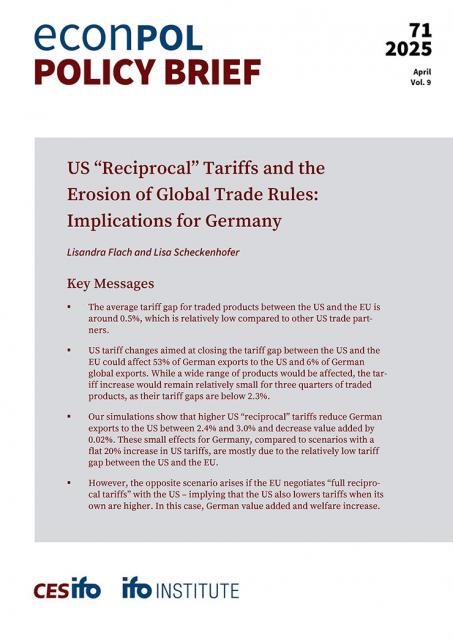News Archive

EEAG Report on the European Economy 2021 - Beyond the Coronavirus Crisis: Investing for a Viable Future
|
EconPol Special Publication
| News
The coronavirus crisis has led to the sharpest economic downturn in modern times and poses unparalleled challenges to policy both on a national and an EU level, as well as globally. The European Union has launched the ground-breaking Next Generation EU (NGEU) program, which involves common burden-sharing and explicitly aims to strengthen social cohesion within the European Union. If it succeeds, it will strengthen both the role of the European Union and cohesion within the European Union.

The Role of Fiscal Policies for External Imbalances: Evidence from the European Union
|
Working Paper
| News
This research from António Afonso and José Carlos Coelho studies the existence of a causal relationship between the general government balance and the current account balance (assessed as a percentage of GDP) for 28 European Union countries, using annual data for 1996 to 2019. They find that an increase in budget deficit of 1 pp of GDP results in a deterioration of the current account deficit of 0.318 pp of GDP, which supports the Twin Deficits Hypothesis.

Vaccines: How to Use Market-Based Incentives to Ramp Up Production
|
EconPol Opinion
| News
Economic incentives to accelerate vaccine production would be much more productive than the empty threat of suing AstraZeneca - the additional cost for boosting vaccine supply for Europe might run into a couple of billions of euros, but this would be a lot less than the cost of prolonged disruption to the economy and society, let alone the lives lost. Clemens Fuest and Daniel Gros examine the EU's mistakes.

The Global Economic Impact of Politicians: Evidence from an International Survey RCT
|
Working Paper
| News
- Read more about The Global Economic Impact of Politicians: Evidence from an International Survey RCT
A large-scale RCT survey of 843 experts in 107 countries examined how the US president influences economic expectations of international experts, including GDP growth, unemployment, inflation and trade in their country. The results show that the election of Joe Biden increased growth expectations of international experts by 0.98 percentage points for the year 2021, that treatment effects materialize only in the short-run and experts’ uncertainty increased after the election.

International Transmission of Interest Rates: The Role of International Reserves and Sovereign Debt
|
Working Paper
| News
In this study of the determinants of international transmission of interest rates with a special emphasis on the role of international reserves and government debt, authors confirm that the trilemma still holds. They find significant spillovers from the U.S.
